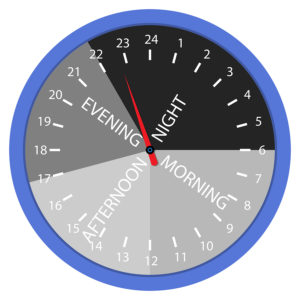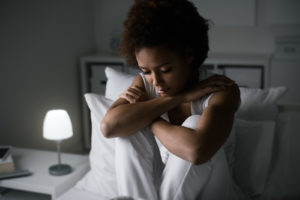Ever wondered how your body always knows to feel tired and drowsy at night and to stay alert during most hours of the day? This phenomenon can be attributed to your body’s inherent body clock called the circadian rhythm. As the name suggests, the circadian rhythm is repetitive on a strictly regular basis. This explains why you will almost always feel sleepy at the same times during the day or night.
Your body’s sleep/wake cycle is the timekeeper responsible for reminding you when you need rest. It is housed in a part of your brain that responds to light, explaining why we always tend to be most alert during the morning hours and sleepier during the wee hours of the night.
However, the circadian rhythm is not a system that is set in stone. It causes dips and rises in your levels of alertness throughout the day either naturally or based on a number of factors. For instance, some people (those referred to as “morning people”) will find that their alertness or wakefulness levels are highest from around 6 am to 11 am. Others may find that this period of extreme alertness comes later on in the day. Typically, however, a healthy human being is likely to experience the strongest desire to rest around 1 pm to 3 pm and between 2 am and 4 am in the morning. The former period is dubbed “the post-lunch crash” where wakefulness levels dip significantly.

The circadian rhythm may also be affected by a number of factors:
Age – Your circadian rhythm adapts to your current energy needs. For instance, teenagers need more sleep than adults. Their circadian rhythms are programmed to take them to bed earlier and to sleep for longer than an adult naturally would. Therefore, the older you grow, the more your rhythm changes to adapt to your body’s needs.
Work/Activity – it is obvious that staying awake all night is neither impossible nor as unpleasant as you would expect it to be. Whether it is for work or entertainment, your circadian rhythm may readjust itself if you interrupt the cycle for a long period of time. When this happens, it results in poor sleep quality and daytime drowsiness among other sleep disorders.
Circadian rhythm sleep disorders are more common these days on account of the fact that most people work both days and nights. Also, cellphones, TVs, computers, and other notorious emitters of artificial blue light can have a serious impact on our ability to sleep.
Disorders arising from a disrupted circadian rhythm can be grouped into five major types:
1. Delayed Sleep Phase (DSP) Disorder
DSP is a circadian rhythm disorder characterized by the inability to go to sleep earlier than well past midnight. If you’re suffering from this disorder, you find that you cannot sleep any earlier than 1am. In most cases, DSP might leave you feeling like you never have enough sleep at night, leading to day drowsiness and general tiredness.
2. Advanced Sleep Phase (ASP) Disorder
Considered the opposite of DSP, ASP occurs when an individual finds it hard to sleep right until morning. For these kinds of people, waking up at between 2am and 5am is a regular occurrence no matter how early they sleep. ASP also becomes progressively worse with age.

3. Jet Lag
Jet lag is another circadian rhythm disorder. Traveling through different time zones (particularly when traveling towards the East) can disorient your sleep cycle, making it very hard for you to sleep and stay awake at the required times.
4. Shift Work Disorder
This is a common circadian rhythm disorder in people who work during the night and sleep during the day. Performing the latter task is often harder than it should be on account of the fact that the body is most alert during the day. For such people, using sleep props such as blinds to limit the amount of light that comes into the room can help trick their circadian rhythm into thinking that it is time to sleep.
5. Irregular Sleep
People suffering from chronic insomnia sometimes sleep in short bursts that last around two to three hours spread across the whole day. While this is detrimental to the quality of sleep one gets, it is better than having to induce sleep with medication.
Three Ways to Get Your Circadian Rhythm Functioning as it Should
Circadian rhythm disorders range in severity depending on how long the problem has been going on. Poor sleeping habits are the main culprit, although technology in the bedroom has proven to be a big inhibitor to getting the right amount of sleep.
The good news is that a disrupted circadian rhythm can be “reset” (so to speak) by a few simple steps:
1. Regulating Your Sleep Schedule
Try as much as possible to not only have a regular bed time, but also a consistent waking up time. Consistency is what eventually regulates your circadian rhythm, keeping your mind alert throughout the day and enhancing the quality of your sleep at night.
2. Take an Early Morning Walk
If you’re struggling to wake up in the morning, try taking a walk outside immediately after your alarm goes off. If that proves cumbersome, try opening the shades wide open to let in a lot of natural light. Being exposed to the morning sun is almost enough to fully reset your circadian rhythm. It will also make your mind immediately alert and give you an energy boost to get you through the morning.
3. Keep Technology away from the Bedroom
And not just your phone, this rule applies to every bit of technology that may emit artificial blue light. Put down your phone and switch off the computer and television a few hours before bedtime. Blue light is very distracting and it can keep you awake for longer periods of time even if you’re tired and ready to go to bed.
Keep the sleeping area dark and moderately quiet to avoid distractions and to make your transition from wakefulness to sleep smooth and uninterrupted.
The circadian rhythm is essential to the functioning of a human being. Other than keeping a regular bedtime, exercising, and limiting the amount of artificial light you’re exposed to before bedtime, melatonin supplements, sleep aids, and light therapy can help put your circadian rhythm back on track.

